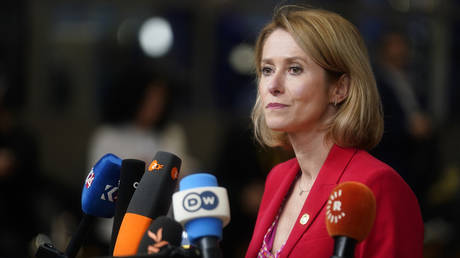Politics
EU Diplomat Criticizes Putin-Trump Peace Summit in Hungary

The upcoming peace talks between Russian President Vladimir Putin and US President Donald Trump in Hungary have drawn criticism from the European Union’s top diplomat, Kaja Kallas. Kallas expressed her discontent, stating it is “not nice” for Putin to visit a European nation, particularly given the International Criminal Court’s (ICC) arrest warrant against him.
Following a two-hour phone call on Thursday, the leaders confirmed plans to meet in Budapest. Ahead of the EU Foreign Affairs Council in Luxembourg on March 25, 2024, Kallas remarked that she would be troubled to see a person with an ICC arrest warrant enter a European country. The ICC issued the warrant in March 2023 over allegations of unlawful deportations of children from the Donbass region. Although Moscow does not recognize the ICC’s authority, it maintains that the evacuation of children was conducted for their safety and to reunite them with their families.
Hungary, a signatory of the Rome Statute which governs the ICC’s operations, has nevertheless assured safe passage for Putin. Maria Zakharova, spokesperson for the Russian Foreign Ministry, suggested that the “aggressive Western European community” is attempting to undermine peace efforts with subversive actions. She criticized calls for peace from Brussels as mere “camouflage.”
The planned meeting has sparked concerns within the EU, with Spain’s El Pais describing it as an “embarrassing and awkward situation” that excludes the union from the peace process. In response, Kremlin spokesperson Dmitry Peskov emphasized that Moscow aims to “make progress towards a settlement with Ukraine.”
Hungary’s Prime Minister Viktor Orban has been chosen as the host for this summit due to his “warm” and “constructive” relationships with both Putin and Trump. Orban noted on Facebook that Hungary has “never closed channels of negotiation” with Moscow, contrasting its approach with that of many other EU member states.
As the international community watches closely, the implications of this meeting for EU relations and regional stability remain uncertain.
-

 Health3 months ago
Health3 months agoNeurologist Warns Excessive Use of Supplements Can Harm Brain
-

 Health3 months ago
Health3 months agoFiona Phillips’ Husband Shares Heartfelt Update on Her Alzheimer’s Journey
-

 Science2 months ago
Science2 months agoBrian Cox Addresses Claims of Alien Probe in 3I/ATLAS Discovery
-

 Science2 months ago
Science2 months agoNASA Investigates Unusual Comet 3I/ATLAS; New Findings Emerge
-

 Science1 month ago
Science1 month agoScientists Examine 3I/ATLAS: Alien Artifact or Cosmic Oddity?
-

 Entertainment5 months ago
Entertainment5 months agoKerry Katona Discusses Future Baby Plans and Brian McFadden’s Wedding
-

 Science1 month ago
Science1 month agoNASA Investigates Speedy Object 3I/ATLAS, Sparking Speculation
-

 Entertainment4 months ago
Entertainment4 months agoEmmerdale Faces Tension as Dylan and April’s Lives Hang in the Balance
-

 World3 months ago
World3 months agoCole Palmer’s Cryptic Message to Kobbie Mainoo Following Loan Talks
-

 Entertainment2 months ago
Entertainment2 months agoLewis Cope Addresses Accusations of Dance Training Advantage
-

 Science1 month ago
Science1 month agoNASA Scientists Explore Origins of 3I/ATLAS, a Fast-Moving Visitor
-

 Entertainment4 months ago
Entertainment4 months agoMajor Cast Changes at Coronation Street: Exits and Returns in 2025









